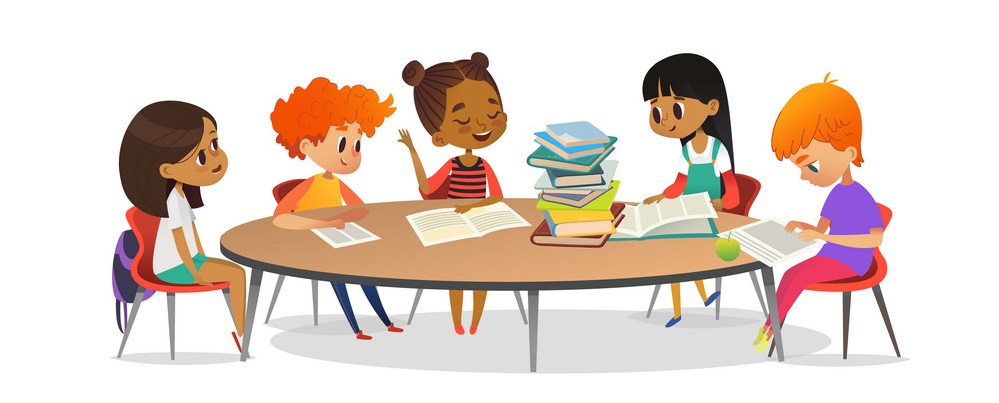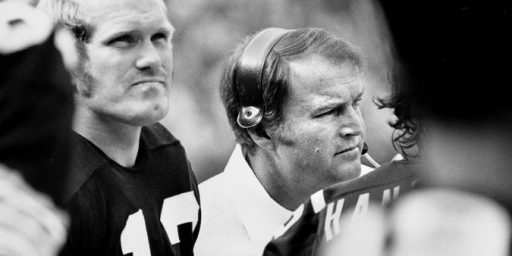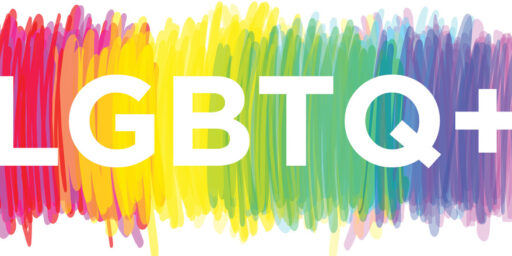Fear and Censorship in Education
Teachers are frustrated over interference from outside.

WaPo’s Hannah Natanson provides an anecdote-filled report titled “‘Slavery was wrong’ and 5 other things some educators won’t teach anymore” with the subhed “To mollify parents and obey new state laws, teachers are cutting all sorts of lessons.” The titular anecdote is representative:
Greg Wickenkamp began reevaluating how he teaches eighth-grade social studies in June 2021, when a new Iowa law barred educators from teaching “that the United States of America and the state of Iowa are fundamentally or systemically racist or sexist.”
Wickenkamp did not understand what this legislation, which he felt was vaguely worded, meant for his pedagogy. Could he still use the youth edition of “An Indigenous Peoples’ History of the United States”? Should he stay away from Jason Reynolds and Ibram X. Kendi’s “Stamped: Racism, Antiracism, and You,” especially as Kendi came under attack from conservative politicians?
That fall, Wickenkamp repeatedly sought clarification from the Fairfield Community School District about what he could say in class, according to emails obtained by The Post. He sent detailed lists of what he was teaching and what he planned to teach and asked for formal approval, drawing little response. At the same time, Wickenkamp was fielding unhappy emails and social media posts from parents who disliked his enforcement of the district’s masking policy and his use of Reynolds and Kendi’s text. A local politician alleged that Wickenkamp was teaching children critical race theory, an academic framework that explores systemic racism in the United States and a term that has become conservatives’ catchall for instruction on race they view as politically motivated.
Finally, on Feb. 8, 2022, at 4:05 p.m., Wickenkamp scored a Zoom meeting with Superintendent Laurie Noll. He asked the question he felt lay at the heart of critiques of his curriculum. “Knowing that I should stick to the facts, and knowing that to say ‘Slavery was wrong,’ that’s not a fact, that’s a stance,” Wickenkamp said, “is it acceptable for me to teach students that slavery was wrong?”
Noll nodded her head, affirming that saying “slavery was wrong” counts as a “stance.”
“We had people that were slaves within our state,” Noll said, according to a video of the meeting obtained by The Post. “We’re not supposed to say to [students], ‘How does that make you feel?’ We can’t — or, ‘Does that make you feel bad?’ We’re not to do that part of it.”
She continued: “To say ‘Is slavery wrong?’ — I really need to delve into it to see is that part of what we can or cannot say. And I don’t know that, Greg, because I just don’t have that. So I need to know more on that side.”
As Wickenkamp raised his eyebrows and pursed his lips, she added, “I’m sorry, on that part.”
Wickenkamp left the Zoom call. At the close of the year, he left the teaching profession.
Contacted for comment, Noll wrote in a statement that “the district provided support to Greg with content through a neighboring school district social studies department head.” She did not answer a question asking whether she thinks teachers should be permitted to tell children that slavery was wrong.
It strikes me that Wickenkamp was being absurdly provocative here while Noll was being absurdly bureaucratic. The state law was new and controversial. There’s just no way that the superintendent was going to give a teacher permission to express an opinion on a racial matter—even one so benign and obvious—on a recorded Zoom call.
I happen to have an 8th grader and she has no doubt that slavery was wrong; I doubt anyone in her class thinks otherwise. Hell, I went to 8th grade more than 40 years ago and similarly had no doubt that slavery—or Jim Crow laws—was wrong.
But, frankly, teachers can teach kids that slavery is wrong without uttering the phrase “slavery was wrong.” Indeed, outside of kindergarten-level lessons about manners, I’m not sure it’s ever necessary for teachers to express moral judgments of the materials they’re teaching. With regard to slavery, detailing the manner in which they were acquired, transported, and treated would almost certainly lead young minds to grasp the horrors of the institution independently.
Some of the other examples given were perhaps more debatable. For example, the inclusion of a chapter from Howard Zinn’s A People’s History of the United States was of course going to be seen as ideological since it’s an ideological tract.
Others were examples of schools responding to parent complaints or, again, pressure from politicians passing new laws and administrators being unsure as to how they were going to be enforced. And, while most of the examples were of teachers being pressured—or self-censoring themselves—over teaching things that might get a rebuke from conservatives, there was also pressure from the left over teaching Huckleberry Finn and Of Mice and Men because of the inclusion of racial slurs.
In all cases, it appears that teachers were trying to be inventive and include materials likely to appeal to their students. But, yes, they were also trying to make a point beyond that of the state-mandated curriculum about societal values.
The takeaway is this:
The quiet censorship comes as debates over whether and how to instruct children about race, racism, U.S. history, gender identity and sexuality inflame politics and consume the nation. These fights, which have already generated at least 64 state laws reshaping what children can learn and do at school, are likely to intensify ahead of the 2024 presidential election. At the same time, an ascendant parents’ rights movement born of the pandemic is seeking — and winning — greater control over how schools select, evaluate and offer children access to both classroom lessons and library books.
While we’re in a particularly contentious period in this regard, the broader phenomenon is hardly new. The nature of public education is that the public has a say in what the schools teach. During particularly contentious periods, not surprisingly, that fight is ratcheted up. Parents, not shockingly, don’t want their kids’ teachers imparting values that contradict the ones being taught in the home.
But, of course, if every parent gets a veto over the assigned materials, teachers are going to be frustrated. And the materials will be bland, uninspiring, and less likely to actually teach.






The whole point is that a single complaint can cost you your job, or land you in prison.
No, he was seeking clarification on an absurdly-worded law passed by morally bankrupt ideologues. If you’re going to teach, you need to know exactly where the lines are, because some sh!t-disturber–either student or parent–who is itching to make a point will do so before you have time to blink.
This is no laughing matter for teachers. I have a friend who is an elementary school teacher in Florida. Her room has been stripped of all books while each one is reviewed to see if it’s okay for her to have in her classroom.
Republicans are destroying this country with this nonsense.
What is fascinating is at exactly the same time the GOP is bellyaching about being canceled by people who are not the government or in government they are using government to cancel anything or anyone whom they deem “offensive”. They don’t even have the self-awareness that god gave a ant to understand they are the ones using the power of the government to restrict speech.
@Jen:
Wickenkamp is guilty of the worst of all crimes, explicitly drawing attention to a problem with the current system /sarc
James, sometimes you are just blind to trends in society. There is a small but currently ascending contingent in the trump states who hold that slavery was not wrong, that in fact it was some kind of benevolent parent/child relationship. And before you dismiss it as the ravings of a few in the hinterlands, think about the fact that the 2022 Republican nominee for AG in Maryland was a card carrying member of the League of the South, heck, not just a member but a board member! Although he was the most “out” of the Republican Slate, all of them were of the same ilk.
And in case you are unaware of the beliefs of the League of the South, here’s a statement from one of his fellow board members:
Or how about this, on their website:
Or this, from their official spokesman:
“But, frankly, teachers can teach kids that slavery is wrong without uttering the phrase “slavery was wrong.” ”
In other words, it’s up to teachers to subvert the will of the school officials, risking their jobs to do the minimum of what’s right at the risk of their jobs.
If we were talking about teachers in North Korea, we would applaud their bravery. For some reason you seem to endorse the Kim Jong-Un approach to education — students can only learn what the supreme leader personally approves of, and maybe the bravest of teachers can slip in a tiny bit of the truth.
Should teachers be forbidden to say that the Holocaust was bad, as well? Or that it happened? I mean, if there are parents who will get mad?
@Rick DeMent: “They don’t even have the self-awareness that god gave a ant to understand they are the ones using the power of the government to restrict speech.”
Freudian projection is their core method.
You can teach history without saying things are right and wrong if it’s worth it. Cutting off the head of Louis XVI and The Terror? Maybe it was worth the cost. Bombing Germany and Japan into rubble in 1945? Same. But slavery and Jim Crow and the westward expansion are tougher sells, especially to kids. Not only is it wrong but it’s incomprehensible. Committing genocide for a cut on a possible gold find or owning humans in order to be a player in the cotton trade? It makes everyone out to be a Good German and nothing more.
Part of the reason The Lost Cause spread everywhere is it’s a romantic myth. Americans can’t handle the romantic aura of killing a mine owner or offing a bunch of slaveowners, so they had to settle with Robert E. Lee. Because the rest of American history is pretty dreadful. We stole all of this land from Native Americans and then sat down to farm it and read the Bible. Hypocritical and boring? Who can resist.
I think that’s why there’s a convergence of sex ed and the rest of education. Closed doors, frigidity, tight-lipped dads terrified of their daughter’s virginity…
This has been around for a while. I have known people who have argued exactly this, that slaves were taken better care of, and lived better lives than, free Blacks. It’s frankly gut-churning to hear people say this, and from my experience there is a whole lot of rationalizing going on with the Bible & Gone With the Wind crowd over this. This isn’t a fringe argument–it’s just not one that you often hear unless the people doing the discussing think they are in a crowd of friendlies who share their appalling thoughts.
One of the lessons of history of repressive regimes is creating an environment of fear leading to self-censorship.
The rules are vague, the enforcement arbitrary and capricious. But the direction is crystal clear- anything that upsets the most conservative parent is taboo and will be punished.
But frankly, just “detailing the manner in which they were acquired, transported, and treated” would no doubt lead to even more strenuous protests from the parents. C’mon James, here of all places we should be able to call out the racists for what they are.
My question…what are people like this so afraid of children learning?
Not teaching that systemic racism exists, is a prime example of systemic racism.
This
is not good, man. The laws driving this are terrible and they are being driven by bad people, and if they are excused by good people because “it’s controversial,” that’s the “good” people siding with the bad.
I went to HS in the mid-seventies.
It wasn’t until a couple years ago that I learned about the Tulsa massacre.
These people want to make sure that history stays buried.
Fuq that noise.
Yes, everyone knows slavery was bad. But somehow when there’s a movie like Roots or Twelve Years a Slave there seems to be a rash of people saying they’re shocked to find out slaves weren’t treated well. People object to tour guides showing them the slave quarters at Monticello. People think it’s amusing irony that Angela Davis has slave owning white ancestors. How do they think that happened?
@daryl and his brother darryl: I believe I’ve mentioned here before that my mom learned about Japanese internment camps in the US when my sister and I were doing our WWII homework.
This country has a very long track record of ignoring ugly truths.
@Jen:
I cannot be sure about when I first learned of the internment camps…but I’m certain it was NOT in HS History.
@daryl and his brother darryl: I didn’t learn about Tulsa until I was in my 40s (via a show on NPR, I think–I still remember where I was when I heard it, which is how profound it was to me). I didn’t read the “Cornerstone Speech” until I was in my later 30s (maybe later?).
I graduated from HS in 1986, attending in both Texas and Southern California.
And how did you and your daughter aquire this stance? You weren’t born with it, so where did it come from? Were you taught it, or was it an independent philosophical exercise on your and her parts?
I am management and have been in that role for many years. I think you are wrong about Wickencamp. I think that you should expect employees to ask very specific questions so that they know precise limits when you make a major change in policy, one that would require them to stop behaviors they have engaged in throughout their entire careers and especially when the policy is vague, which the stance thing clearly is. Is it a stance or a statement of fact to say that it would be wrong to kidnap a bunch of 14 y/o girls and force them into sexual slavery? That seems like a statement of fact to me. So Wickencamp needed a clear black and white answer here since his job was at risk.
Does it make a difference that our slavery was in the 1800s? If you were really teaching history you would note that slavery had largely been eliminated in the first world by then and that the last state in the north to get rid of it was NJ in 1830. If you were really teaching history you might explore why the American South almost uniquely continued to deny it was wrong. Maybe you even explore how concepts of right and wrong or at least what is acceptable in social norms changes over time and how this extends well beyond slavery. How it was OK for women to not have rights including voting, how it was OK treat Asian workers poorly, act against Americans of many different nationalities and religions just because they were different. OK to deny gay people jobs and beat them. Of course none of these are politically correct on the right so that’s not happening.
I think Noll is likely in a tough spot, one I can appreciate having been in middle management. Its a vague rule that will be selectively enforced and monitored by political extremists. There is no right answer she can give as it will likely change at the whim of the local prosecutors and judges. I think she had to take the most risk free approach and just tell I’m to avoid anything that might be controversial and remind him that anything can be controversial.
Steve
Don’t know, could she be related to Anthony Johnson of Virginia, who, an Angolan, worked off his indenture then became a landowning farmer with several white and black indentured servants. Except he never agreed his indentured servant John Casor, from Africa, had completed his indenture. And when white neighbors hired Casor and he left Johnson, Johnson sued the neighbors. The end result of the lawsuit being that black John Casor was ruled to be a slave owned by black Anthony Johnson. The significance being John Casor is the first black African slave, not indentured servant, in Virginia.
Or perhaps she has a white female ancestor who married a black African slave by choice thus becoming a slave to her husband’s master and all her children also being born slaves? See the well documented case of Eleanor “Irish Nell” Butler, though she was only an indentured servant, but Maryland had a law that covered English women as well.
This is an example of most of the problem most of the current teaching on slavery is enamored with “slave porn”, abuse as happens when any group is outside full protection of the laws. And abuse did happen, but less than people like to fantasize about since widespread abuse ran the risk of a slave revolt.
In human history, slavery is not a racial issue. That the US had slavery based on race is. But to teach slavery is bad for humans, you can skip over the racial emphasis and let the kids make the link themselves.
“Precisely what makes a slave is that he is allowed no use of productive capital to make wealth on his own account.”
A slave in a gilded palace, treated with the greatest care, as some where in history, were still slaves with the product of their labor owned in whole or part by someone else. The problem with this broader view is that it veers terribly close to the beloved socialism of many of these educators.
I almost want to thank JKB for disproving Dr. Joyner’s “everyone knows slavery was wrong”, but good goddess, that was horrifying.
@JKB:
Good dawg, haven’t you anything better to do with your time than crawl through cesspools looking for perverse examples of pretzel logic? How sad.
@DrJJoyner:
So as I said the other day in the Ruy Teixeira thread: the majority of white men (who are on the political right) are the problem and need have a big confab, sitting in a big circle, and stop pointing fingers at ‘hiLLarY’s bAd cAmPaiGn’ and Latinx and Democratic messaging and ask each other, finally, “Wtf wrong with us and our twisted morality?” Exhibit A.
@JKB:
Exhibit B.
This is why we need both wokeness and CRT. And white men who adhere — or used to adhere — to a political ideology that gave rise to Trump need them more than most.
Dear Lord. God help y’all. And black queer folk like me, living in a country where people like this have voting power. Smdh.
@JKB: No socialism that I’m aware of stipulates that one party to a marriage can be bound and transported to a place far away, and forced to remain there apart from their spouse and children. None. “Bound and transported” is what the English Courts balked at doing in 1772 in the case of Somerset v. Stewart, after all.
Until that becomes a fundamental aspect of socialism, I would strongly recommend you stop comparing them. Also, I would strongly recommend against whataboutism, which your comment is a fine, well-researched example of.
I mean, if you have some direct objection to the conversation, say so.
@daryl and his brother darryl:
I also went to high school in the mid-70s, in probably the most liberal county in America. It was only this year that I learned about the California genocide, and then only because I read Rebecca Solnit’s posts pretty much on a daily basis. That led me to “Savage Dreams: A Journey into the Hidden Wars of the American West”.
My family has been in California for over 100 years. But we all grew up on the myth of the American west. I have no idea if the situation is any better in schools now, but I kind of doubt it.
@JKB: If only Angela Davis had explored her geneology on an episode of “Finding Your Roots,” so your questions were answered before they were asked.
Oh, wait…
@daryl and his brother darryl: “It wasn’t until a couple years ago that I learned about the Tulsa massacre.”
I went to school — elementary and high — in Berkeley Fucking California in the 70s and it wasn’t until a couple of years ago that I learned about the Tulsa massacre. Yes, it was buried deep, but even in Berkeley there just wasn’t the educational and historical infrastructure to teach it. We got slavery bad, Harriet Tubman good, and that’s what we’ve got time for…
@anjin-san: “It was only this year that I learned about the California genocide, and then only because I read Rebecca Solnit’s posts pretty much on a daily basis. ”
And I only learned about the Sand Creek Massacre a couple of years ago, when a lecture I was writing on the death of the western brought me to the movie Soldier Blue, and its re-enactment of the massacre designed to evoke the then recent My Lai incident…
For all that the right whines that all liberals only want to teach the bad things America has done, I have to say I was taught essentially none of them, and again, that was in Berkeley California in the 60s and 70s.
PSA:
Before you even read a comment by a known troll, ask yourself this: “Do I need more anger in my life?”
@wr: If this had been the world that I was living in when the company I worked for was sold, instead of going back to school, I would have taken one of the dozen or so offers of “we can find a place for you*” instead of going back to become a teacher. Then again, the corrupting of young minds part of the job (by teaching them to think for themselves and express those thoughts cogently) was the only part I was ever interested in.
“Two paths diverged in a woods and I–I took the one less traveled by, and that has made all the difference.” Alas, that road has been paved over, but I am glad that I got to take it. 😐
*And these were a dozen or so people who realized that I was a mercurial flaming a****le.
@daryl and his brother darryl: You and I don’t see eye to eye often, but YES!!!!! THIS times 1000!
@wr:
If you were at Berkeley High in the 70’s you may know some of my cousins.
Very absurd and Orwellian JJ. You can say slavery is wrong without saying it? WTH? It seems to me you are actually highlighting what’s wrong with the current laws and their interpretation. I have no issue saying without equivocation that slavery is wrong and evil. There.
My sister who is a conservative and voted twice! for Trump has argued in favor of slavery in America. After all, it brought black people to America where they had a better life than in Africa. Now. She argued this even though she’s married to a black American and her daughters look black as well.
Conservatives have absolutely no problems with slavery – as long as it involves some other group.
@ James
Wow. Well that is something!
The phrase “slavery was wrong” seems like just about the weakest tea imaginable. If I was teaching an 8th grade history class on the subject, I would probably lead with “Slavery was a hideous, unspeakable evil. I probably will fail to teach you just how unimaginably bad it was, so whatever I say, assume the reality was worse. You won’t be wrong.”
Let me imagine a conversation about slavery with someone I’ve known since grade school who now identifies as conservative:
OK, slavery was bad…
It was a really long time ago…
Why are you talking to me about this? I certainly never owned any slaves. I mean, I have black friends!
America is not racist!
I’m getting a little tired of black people making excuses for their failures…
Can we talk about black-on-black crime now?
“But, yes, they were also trying to make a point beyond that of the state-mandated curriculum about societal values.”
Do state-mandated curriculum require that we teach kids the basics of kindness and decency? That we ought to instill in them confidence?
If not, teaches should do nothing in service of those “societal values”?
I think the conflict between James and most commenters is that James believes that those who passed the law are acting in good faith, while most commenters believe that assumption is ridiculous.
Personally, if I believed the good faith of conservatives on this issue I would be willing to engage in a discussion about what is allowed and what isn’t. But I don’t trust them, so I think that “not allowed” will turn out to be anything that they can get anti-liberal traction on, regardless of whether it is happening or not. For example:
In a school district in near me, a student claimed she was given a failing grade because she refused to read a particular book, a high profile one that comes up in every discussion of what books shouldn’t be allowed in school libraries. The local conservatives were outraged, demanded the teacher be reprimanded and the book removed.
The girl was lying, as the board determined very quickly. All it took was asking other students in the class, all of whom said that the book was not assigned reading, that none of them read it and they didn’t fail. Also, there is only a single copy of the book in the library, it’s been there for years and has only been checked out once.
This is California, the school board kept the book, backed the teacher, and said that was the end of it as far as they were concerned. Would the same thing happen in Iowa? Why would a teacher take the chance?
@Anjin-san: I may, but probably not without names!
@wr:
I messaged you on FB.